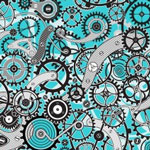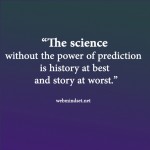Emergence, referred to the new properties of an entity different from the properties of its components, is not a new concept.
Even Aristotle in his classic book Metaphysics has some clear notions of the emergence concept:
As that which is compounded out of something so that the whole is one – not like a heap but like a syllable – the syllable is not its elements, ba is not the same as b and a, nor is flesh fire and earth…
The syllable, no longer exist, but the elements of the syllable exist and so do fire and earth.
(you can download the book from here)
However for anyone interested in both classic books and the concept of emergence, nothing would be more interesting and engaging than Leviathan. I’ve bought the book couple of years ago and left it just after reading the first pages. Curiosity as a driving force was not enough to push me for reading more than a few pages.
A couple of days ago, I saw the book again and after reading a few passages, couldn’t put down the book before finishing the last page.
The reason was not my interest in political philosophy, as it’s still my least preferred topic. The clear image of the emergence concept in Hobbes’ mind made me read the book.
It’s amazing that an author had such a vivid image of the concept and it’s clearly stated in his book published in 1561. Hobbes approves a mechanistic view of the world but considers the whole system so complicated that the total behavior can’t be clearly described by the behavior of the components.
Sure I’m not going to write a review or even a summary of a book categorized under title of the political philosophy, but I’ve decided to quote a few sentences of the book which I have found inspiring (You can read the whole book here):
Nature… is by the art of man, as in many other things, so in this also imitated, that it can make an Artificial Animal.
.
For seeing life is but a motion of Limbs, the begining whereof is in some principall part within; why may we not say, that all Automata (Engines that move themselves by springs and wheeles as doth a watch) have an artificiall life?
.
Art goes yet further, imitating that Rationall and most excellent worke of Nature, Man.
.
For by Art is created that great LEVIATHAN… which is but an Artificiall Man; though of greater stature and strength than the Naturall, for whose protection and defence it was intended;
.
and in which, the Soveraignty is an Artificiall Soul, as giving life and motion to the whole body; The Magistrates, and other Officers of Judicature and Execution, artificiall Joynts; Reward and Punishment…are the Nerves, that do the same in the Body Naturall;
.
The Wealth and Riches of all the particular members, are the Strength…Counsellors, by whom all things needfull for it to know, are suggested unto it, are the Memory; Equity and Lawes, an artificiall Reason and Will; Concord, Health; Sedition, Sicknesse; and Civill War, Death. Lastly, the Pacts and Covenants, by which the parts of this Body Politique were at first made, set together, and united, resemble that Fiat, or the Let Us Make Man, pronounced by God in the Creation.
.
Much memory, or memory of many things, is called Experience [a collection of components makes a whole new entity].
.
But whatsoever is the object of any mans Appetite or Desire; that is it, which he for his part calleth Good: And the object of his Hate, and Aversion, evill; And of his contempt, Vile, and Inconsiderable. For these words of Good, evill, and Contemptible, are ever used with relation to the person that useth them: There being nothing simply and absolutely so; nor any common Rule of Good and evill, to be taken from the nature of the objects themselves; but from the Person of the man
Since four centuries ago, the time has changed and we have – or believe to have – a much deeper and wider view of the world. But still it’s joyful to read thoughts of a man who has been far ahead of his age. Believing that we are all parts of nature and so we have no way to do anything un-natural. Believing that the humans as the components of the whole society called Leviathan have not any understanding of the big beast although they have made it by themselves and the most amazing: A man who has a mechanistic view of the world, understands the concept of the soul as an emerging property of the body and applies the same concept to the sovereign, the soul he considers for the society.
Reading the whole book invites us to re-think and re-evaluate our knowledge and wisdom. Seems that we have not gone so much further. Just coining new terms for the old thoughts.





